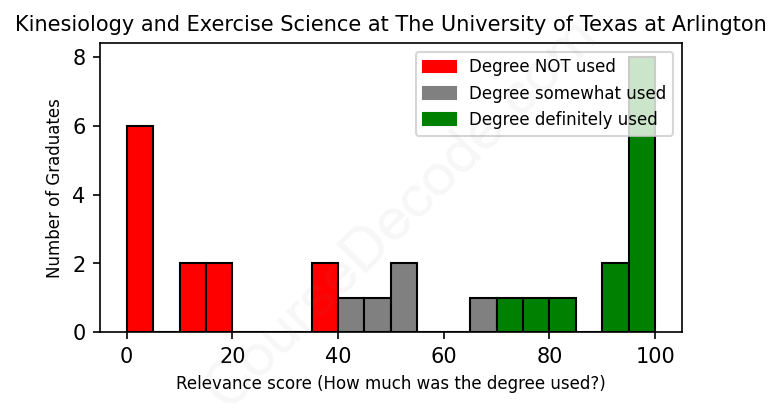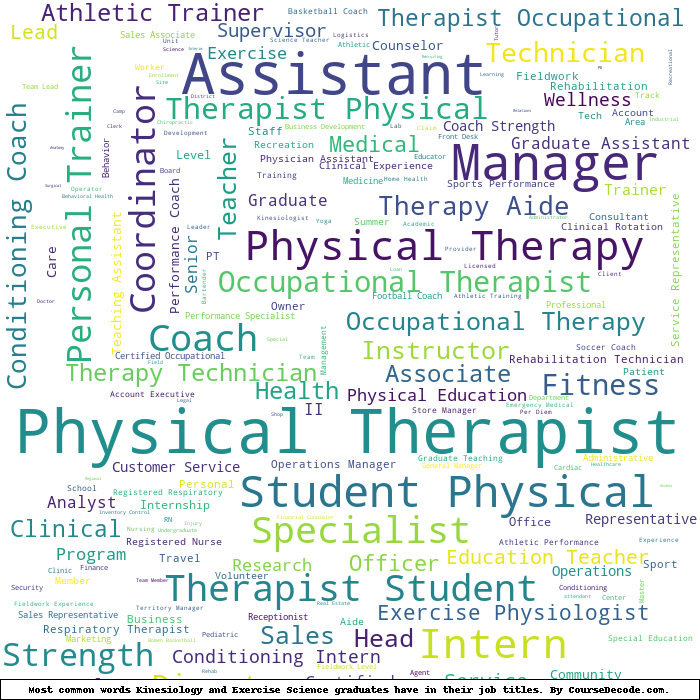
First, some facts. Of the Kinesiology and Exercise Science graduates from The University of Texas at Arlington we've analyzed , here's how many have used (or NOT used) their degree in their career:

These are estimates based on AI analysis of 30 LinkedIn profiles (see below).
The verdict? Significantly below average. Overall, with an average relevance score of 53%, Kinesiology and Exercise Science graduates from The University of Texas at Arlington have a much lower likelihood (-14%) of finding work in this field compared to the average graduate across all fields:
And for comparison, here's the chart for all profiles we've looked at across all degrees.
Also, after graduating, 50% of these graduates have pursued further education other than another Bachelor's degree (such as a Masters degree or other), compared to the average across all profiles of 35%. This suggests you may need more than just a Bachelors degree to be competitive as a Kinesiology and Exercise Science graduate.
See the details:
|
Relevance score: 37% We think this person has NOT gone into a career related to their degree. We think this person has NOT gone into a career related to their degree.
DEGREE INFOGraduated in 2014 from The University of Texas at Arlington with a Bachelor's Degree in Kinesiology and Exercise Science. No other secondary education since. JOB HISTORY SINCE GRADUATIONSummer Camp Counselor City of Austin May 2015 - Aug 2015 Thinker (Direct Service Staff)  Thinkery Apr 2015 - Sep 2015 Visitor Services Lead  Thinkery Sep 2015 - Jul 2016 Visitor Services Coordinator  Thinkery Jul 2016 - Oct 2017 Guest Services Manager  Thinkery Oct 2017 - Aug 2021 Museum Operations Manager  Thinkery Jul 2021 - May 2022 Operations Manager  reflect May 2022 - Present ABOUTpeople + operations |
The top 10 most common jobs done by the graduates we've analyzed (ranked most common to least) are:
When looking at the various jobs held by graduates with a degree in Kinesiology and Exercise Science from The University of Texas at Arlington, a few patterns definitely emerge. Many people have gravitated towards roles that are closely related to health and wellness, particularly in physical therapy and rehabilitation. Positions like Physical Therapist, Clinical Exercise Specialist, and various roles as a Student Physical Therapist pop up often, indicating a strong trend towards hands-on work in the health sector where direct application of Kinesiology principles is critical.
However, not all jobs listed are particularly related to Kinesiology or Exercise Science. A significant number of graduates found themselves in positions like sales associates or administrative roles, which don’t utilize the specialized knowledge they acquired during their studies in a meaningful way. Although some roles, like Health Coach or Exercise Specialist, are highly relevant, others, such as operations management or recruitment consulting, seem to stray far from the degree's core focus. Overall, while many of the jobs are aligned with their studies, there is a noticeable variety, with some graduates working in areas that aren’t directly applicable to Kinesiology and Exercise Science.
Here is a visual representation of the most common words in job titles for Kinesiology and Exercise Science graduates (this is across all Kinesiology and Exercise Science graduates we've analyzed, not just those who went to The University of Texas at Arlington):

Looking at the career paths of graduates from The University of Texas at Arlington who studied Kinesiology and Exercise Science, it's clear that there are a mix of trajectories. Many of them start their first jobs in roles that are directly related to health and fitness, like clinical exercise specialists, physical therapy technicians, or health coaches. This shows that a significant number of graduates are landing initial jobs that align well with their degrees. For example, graduates who began as clinical exercise specialists or physical therapists have been able to build up impressive careers in the health sector, often transitioning into advanced roles like professors or clinical managers over the years.
However, it's also noteworthy that some graduates have ended up in jobs that are less connected to their field. For instance, roles in education, administrative positions, and sales don't always take full advantage of a Kinesiology and Exercise Science background. So, while there are certainly graduates who are thriving in relevant careers within health and wellness—often progressing into solid positions like physical therapists or specialists—others may find themselves diverging into fields where their degree isn't as applicable. Overall, it appears that while many graduates are indeed finding meaningful careers in Kinesiology and Exercise Science, there's a noticeable portion that veers into unrelated areas, especially within the first few years after graduation. This mix highlights both the promising opportunities in health-related fields and the potential for unexpected career paths after graduation.
Honestly, a Bachelor’s degree in Kinesiology and Exercise Science, like the one at The University of Texas at Arlington, can be a bit of a mixed bag. It’s not necessarily the easiest degree out there, but it’s also not the hardest; it really depends on your interests and strengths. If you’re into sports, fitness, and the science behind how our bodies move, you might find it pretty engaging and manageable. There are definitely some tough classes with a focus on biology and anatomy, so you'll need to be ready to hit the books. But overall, with a bit of passion and dedication, many students find it to be a rewarding experience. Just make sure you stay organized and keep up with the coursework, and you’ll probably do just fine!
Most commonly, in the LinkedIn profiles we've looked at, it takes people 4 years to finish a Bachelor degree in Kinesiology and Exercise Science.
So, looking at these graduates from The University of Texas at Arlington, it seems like they’ve had some really mixed experiences in terms of how much they've been making. Some people, especially those who went into academia like assistant professors and clinical specialists, likely found decent salaries as they climbed the ranks. On the flip side, others who took roles in areas like teaching or entry-level positions in healthcare might not be earning what you'd consider "big bucks," at least at first. Many students seem to be transitioning into higher-paying roles as they gain more experience, especially in fields like physical therapy and technical roles in healthcare. Overall, while some might be doing well financially, others might still be working their way up, so it really varies a lot based on the path they've taken.
Here is a visual representation of the most common words seen in the "about" section of LinkedIn profiles who have a Bachelor degree in Kinesiology and Exercise Science (this is across all Kinesiology and Exercise Science graduates we've analyzed, not just those who went to The University of Texas at Arlington). This may or may not be useful:

Here are all colleges offering a Bachelor degree in Kinesiology and Exercise Science (ordered by the average relevance score of their Kinesiology and Exercise Science graduates, best to worst) where we have analyzed at least 10 of their graduates: